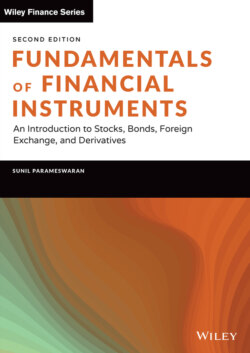Читать книгу Fundamentals of Financial Instruments - Sunil K. Parameswaran - Страница 28
EQUITY SHARES
ОглавлениеEquity shares or shares of common stock of a company are financial claims issued by the firm, which confer ownership rights on the investors who are known as shareholders. All shareholders are part owners of the company that has issued the shares, and their stake in the firm is equal to the fraction of the total share capital of the firm to which they have subscribed. In general, all companies will have equity shareholders, for common stock represents the fundamental ownership interest in a corporation. Thus, a company must have at least one shareholder. Shareholders will periodically receive cash payments from the firm called dividends. In addition, they are exposed to profits and losses when they seek to dispose of their shares at a subsequent point in time. These profits/losses are referred to as capital gains and losses.
Equity shares represent a claim on the residual profits after all the creditors of the company have been paid. That is, a shareholder cannot demand a dividend as a matter of right. The creditors of a firm, including those who have extended loans to it, obviously enjoy priority from the standpoint of payments, and are therefore ranked higher in the pecking order.
Equity shares have no maturity date. Thus, they continue to be in existence as long as the firm itself continues to be in existence. Shareholders have voting rights and have a say in the election of the board of directors. If the firm were to declare bankruptcy, then the shareholders would be entitled to the residual value of the assets after the claims of all the other creditors have been settled. Thus, once again, the creditors enjoy primacy as compared to the shareholders.
The major difference between the shareholders of a company, as opposed to a sole proprietor or the partners in a partnership, is that they have limited liability. That is, no matter how serious the financial difficulties facing a company may be, neither it nor its creditors can make financial demands on the common shareholders. Thus, the maximum loss that a shareholder may sustain is limited to his investment in the business. Hence, the lowest possible share price is zero.
